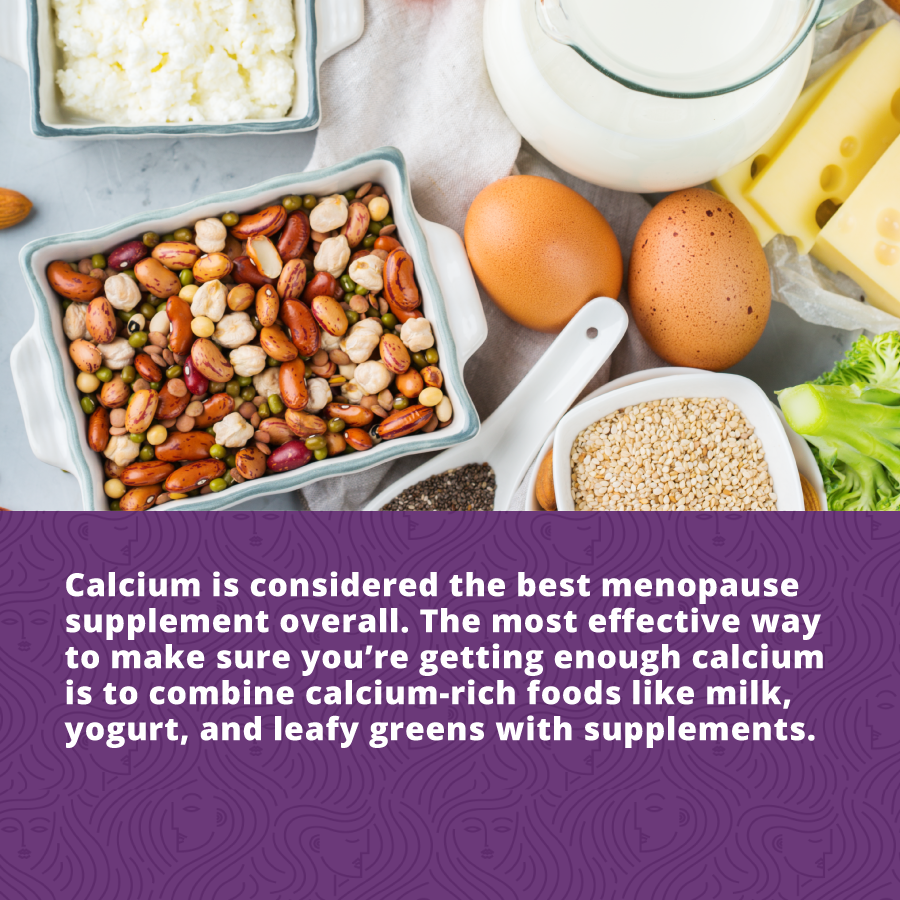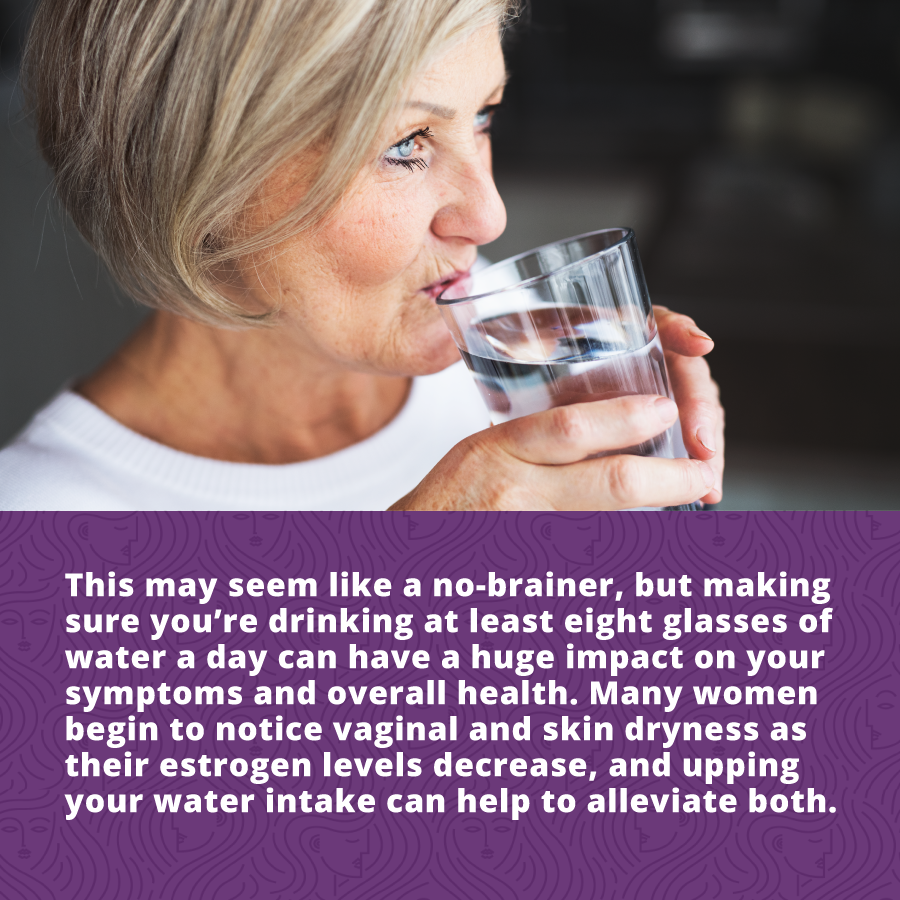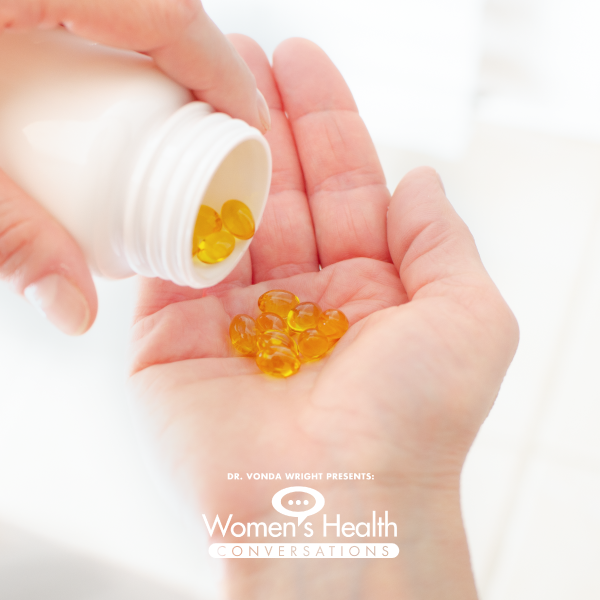The Best Menopause Supplements For All Symptoms
Has “best menopause supplements” graced your frantic midnight Google searches? Forget what the media told you — menopause does not have to be intolerable. It doesn’t have to be solely defined by its unwanted symptoms, like hot flashes, mood swings, and even an increased risk for developing osteoporosis. By strategically choosing the right foods and supplements to incorporate into your daily diet, women can take control of their menopause symptoms and overall health. Supply your body with five of the best menopause supplements to help alleviate your physical and emotional symptoms and build an excellent foundation for a healthy lifestyle. Taking your health into your own hands? That’s what we’re all about!
1. Calcium: Estrogen decline is connected to a decrease in bone density, putting menopausal women at a greater risk for developing brittle and fragile bones (osteoporosis). Additionally, research has shown that our bodies may no longer be able to absorb as much dietary calcium as we age, which could also contribute to a loss of bone density, according to The American Journal of Clinical Nutrition.

During and after menopause, women should aim for consuming 1,000 to 1,200 milligrams of calcium each day, either through food intake or supplements. The most effective way to make sure you’re getting enough calcium is to combine calcium-rich foods like milk, yogurt, and leafy greens with supplements. Calcium is considered the best menopause supplement overall, but it doesn’t stop here!
2. Vitamin D: Pairing 1,000 to 1,200 milligrams of vitamin D with your calcium intake will help to ensure that your body is actually absorbing the calcium you’re putting into it. AKA, it is enhancing your bioavailability! On top of seasonal depression, a vitamin D deficiency can cause fatigue, muscle pain, hair loss, and bone loss and pain. Although the sun is one of the primary natural sources of vitamin D, be wary of putting your skin at risk for sun damage and even skin cancer with too much UV exposure. As a safer, and probably more convenient alternative, you may want to try adding a 600 IU vitamin D supplement to your diet.
3. Fruits & Vegetables: One of the best menopause supplements is the one that tastes delicious! There’s really never a wrong time to start adding more fruits and vegetables to your diet, but this becomes especially important as you approach and are going through menopause. Fruits and veggies are packed full of vitamins and minerals that are essential for a healthy immune system and that can actually help to reduce the common symptoms of menopause. For example, foods like spinach, oranges, and beans, which are rich in folic acid can help to reduce hot flashes according to The Journal of Caring Sciences. Swapping out refined sugars for fruits, which contain a much healthier combination of natural sugars and fiber, can help to boost energy, manage stress, and maintain a healthy weight. Stay seasonal too! Shopping locally grown organic produce not only supports local farmers, it supports a healthy gut full of flourishing microbiota!
4. Soy: Many menopausal women are now shying away from the use of estrogen therapy, also sometimes referred to as hormone therapy, to combat their symptoms. As a natural alternative, adding soy into your diet, which is naturally high in estrogen, may help to eliminate hot flashes and other common symptoms, as soy contains isoflavones that mimic estrogen (The Journal of Nutrition). Keep in mind that all soy products are not created equal. Instead of reaching for a soy-based processed food like a “veggie” burger, try eating plant-based foods like edamame, tofu, and soy nuts.

5. Water: This may seem like a no-brainer, but making sure you’re drinking at least eight glasses of water a day can have a huge impact on your symptoms and overall health. Many women begin to notice vaginal and skin dryness as their estrogen levels decrease, and upping your water intake can help to alleviate both.
Drinking more water can also reduce bloating, another common concern associated with menopause. The more you drink, the more water your body will be able to release, thus eliminating excess water retention.
The Bottom Line
Taking control of your health and wellness before, during, and after menopause can be as simple as making small lifestyle changes like eating the right foods, getting enough exercise, and managing stress. Today, building your individualized approach to taking control of menopause is easier than ever. Lisa Health provides a free, confidential, and easy online assessment to gauge your unique concerns and menopause status. Then it develops a personalized journey plan (delivered via app) to help you beat your symptoms and improve your midlife well-being. Menopause can be much more than a combination of its symptoms. It can be a time to truly rediscover yourself and reevaluate your lifestyle to foster a happy, healthy outlook on life.
If you’re interested in learning more about the steps you can take to become a healthier, happier version of yourself, consider joining the Women’s Health Conversations Facebook group. Here, I (Dr. Vonda Wright) will drop in to share my personal tips and tricks, gauge your interest in specific health topics, and help build a community of smart, savvy women. From nutrition, to breast health, to pain management, to empowerment, to resilience, we’re tackling women’s most requested topics. Join us to take your health in your own hands!

